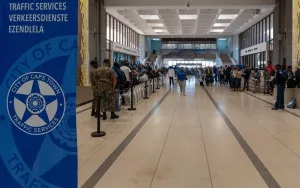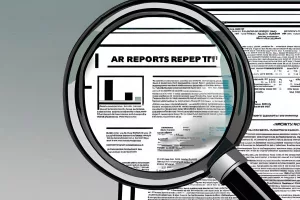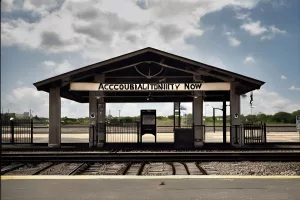On May 6, 2024, a terrible tragedy struck in George, South Africa, when a building on Victoria Street collapsed, killing 34 people. The disaster was not just bad luck; it happened because of serious mistakes and neglect by officials and the construction company. An investigation revealed that safety checks were ignored and construction rules were broken, leading to a call for justice from Minister Thembisile Simelane. As those responsible face legal scrutiny, the community mourns the loss and demands accountability to ensure such a heartwrenching event never happens again.
A recent court ruling has sparked hope for safer railways in South Africa. The case involved a brave young woman who suffered severe injuries after jumping from a moving train to escape an attack. Her fight for justice revealed serious flaws in the Passenger Rail Agency’s safety and security measures. The court’s decision holds the agency accountable and emphasizes the urgent need for improvement in public transport, pushing for a future where passenger safety comes first. This victory could inspire broader changes, ensuring that South Africa’s railways don’t just connect communities but also protect the people who use them.
Ehailing services like Uber offer quick rides but come with serious safety worries. Incidents of driver misconduct and lack of accountability show how vulnerable passengers can be. Stories from Cape Town highlight these issues, with examples of drivers threatening passengers or stealing belongings, revealing the urgent need for better safety measures and communication. As these services grow in cities, tech companies must prioritize user safety and cultural understanding to ensure everyone feels secure and respected during their rides. Balancing convenience with responsibility is key for a safer future in the digital age.
The Portfolio Committee on Home Affairs is like a watchdog for the government, making sure everything is running smoothly and fairly. They go on visits to see how the Department of Home Affairs is doing, checking if promises are being kept and services are good. Their upcoming visit on October 7, 2024, will focus on fixing long lines at offices and ensuring that everyone is treated with respect and dignity, especially those seeking refuge. By looking closely at how things work, the committee helps keep the government honest and dedicated to serving the people better.
SCOPA, the Standing Committee on Public Accounts, plays a vital role in making sure South Africa’s public enterprises, like Eskom and PRASA, are held accountable. They check how these organizations run and spend money, visiting sites to understand their challenges better. Eskom struggles with power supply issues, while PRASA faces troubles in the rail system. Through their visits, SCOPA aims to push for better management and transparency, helping these essential services work efficiently for all South Africans. Their mission is all about ensuring that public resources are used wisely and effectively.
The Mineral and Petroleum Resources Committee in South Africa is on an important journey to ensure that mining practices are safe and fair. Starting their tour in Rustenburg, they are investigating illegal mining and meeting with local workers to learn about its impact on communities. As they visit various mines, they check on health and safety measures and discuss ways to improve environmental practices. By listening to people and taking action, the committee aims to protect both the land and the lives of those involved in mining, working towards a brighter future for everyone.
Roman Cabanac’s journey in politics shows us how personal actions can greatly affect public opinion. Starting with a rocky beginning as chief of staff to the Agriculture Minister, he faced backlash for his controversial social media posts and past remarks. Cabanac’s story is a vivid reminder of the importance of being open and responsible in public service, as well as the need for careful communication. Despite the challenges, his determination to learn from mistakes and push for transparency highlights the complex dance between personal choices and the expectations of governance.
The Workshop for Chief Whips and Chairpersons at Cape Sun Hotel aimed to equip the National Council of Provinces (NCOP) members with the necessary tools to execute their duties efficiently and promote collective action and interconnectedness. The keynote speech delivered by the Chairperson of the NCOP shed light on the workshop’s objective, emphasizing the importance of public participation and international solidarity. The discussions focused on the challenges faced by NCOP and the need to bolster its oversight agenda while steering discussions towards the national dialogue.
The City of South Africa has launched Traffic Fine Roadshows to encourage a more accountable and compliant motoring public, creating a platform for motorists to discuss outstanding fines and clear backlogs. The initiative has garnered impressive responses and helped increase compliance levels, making driving safer for all. The City plans to host at least two more roadshows by the end of the year to continue promoting a culture of accountability and safer roads for all.
South Africa’s newly appointed Minister Gayton McKenzie is bringing sweeping changes to the country’s Sports, Arts, and Culture Department, pledging to redirect funds to support struggling athletes and artists. The reforms include disclosing a comprehensive list of all funding beneficiaries, prioritizing the needs of performers over spectators, and ending the tradition of sponsoring trips for “super fans.” While controversial, the reforms represent a significant shift in the department’s resource allocation, emphasizing transparency, fairness, and support for struggling artists and athletes. The impact of these changes on South Africa’s sports and arts scene remains to be seen.
South Africa’s National Council of Provinces has made significant strides in promoting transparency and accountability in the country’s political system. Two reports were approved, focusing on ethical codes and disclosures of member interests, with harsher penalties suggested for violators. The revised code also aims to tackle ethical issues in social media and proposes riskprofile lifestyle audits. These measures aim to create a more trustworthy and accountable governance system, serving as a model for ethical conduct and representing a key advancement in the political evolution of the nation.
Three law enforcement officers have been charged for their violent attack on a barber in Mowbray, Cape Town, following an indepth investigation by the Independent Police Investigative Directorate (IPID). The victim has chosen to take legal action against the officers and the national and provincial police commissioners. The case brings attention to the urgent requirement for reform and responsibility within South Africa’s policing agencies.
South Africa’s Deputy President, Paul Mashatile, will participate in a session of Questions for Oral Reply, emphasizing the country’s commitment to transparency and accessibility. The National Assembly will also gather to examine committee reports on various bills and host a debate on investing in women, showcasing the country’s dedication to gender equality and women’s rights. The events contribute to a noteworthy day in the history of South African parliamentary procedures, highlighting the country’s commitment to public accessibility and transparency.
UniteBehind is a South African activist group dedicated to promoting transparency and accountability. Their legal confrontations have exposed corrupt practices within the Passenger Rail Agency of South Africa (PRASA), and they have successfully held individuals and organizations accountable for their involvement in the scandal. They continue to advocate for justice and better services for citizens who rely on the rail service.
In a historic decision, Judges John Hlophe and Nkola Motata were dismissed from their judicial roles in South Africa due to gross misconduct. The decision was made by the National Assembly following the Judicial Service Commission’s findings. The dismissal showcases South Africa’s commitment to upholding justice and highlights the accountability mechanisms within the country’s judiciary. The process leading to the decision was lengthy and involved various bodies, demonstrating the regulation and rule of law in the country.
Deputy President Paul Mashatile is facing corruption allegations, including nepotism and violating the code of conduct. The accusations, which have been ongoing for several decades, bring to light a trend of distrust and alleged malfeasance in South Africa’s political sphere. The charges could potentially damage public trust and weaken democratic structures, but they also provide an opportunity for transparency and reform within the political system.
















